AUSTRALIAN BROADCASTING CORP. June 10, 2015
ADELAIDE, Australia --The Ebola virus can live in eye fluid 10 weeks after it is no longer detectable in a patient's blood,
Australian research has confirmedAustralian research has confirmed.
A study undertaken by researchers from Flinders University in South Australia involved Ebola survivor Dr Ian Crozier, an infectious diseases specialist who contracted the disease while treating patients in Sierra Leone in West Africa last August.
Dr Crozier survived after getting treatment in the United States and was declared free of the virus in his blood, but two months later fluid from his eye tested positive for Ebola.
Flinders ophthalmology researcher Professor Justine Smith, who took part in the study, told 891 ABC Adelaide the discovery of Ebola virus in the clear fluid in the front of the eye, between the lens and the cornea, could have big implications for Ebola survivors and for the medical staff who treat them.
Professor Justine Smith says Ebola survivors have little risk of passing on the virus from casual contact if it lurks in their eye fluid.Courtesy: Flinders University
Recent Comments